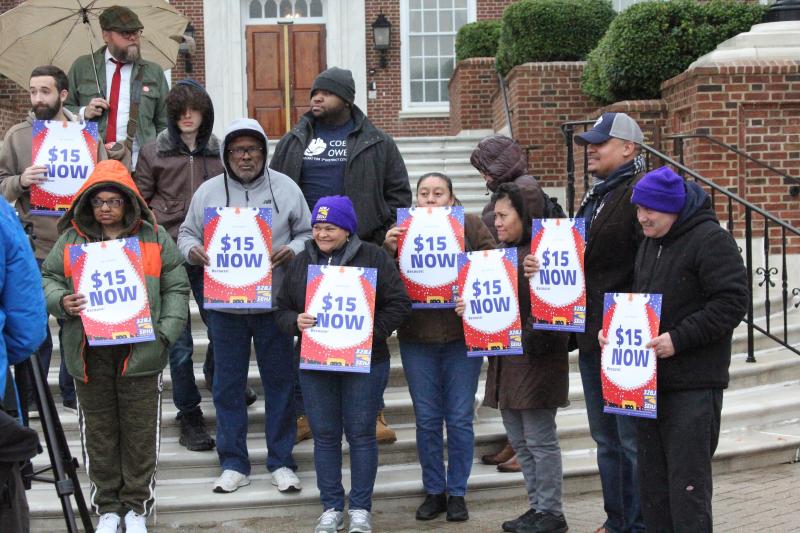Corporate behemoth Amazon has waded into Delaware's minimum wage battle with a recent campaign supporting a $15 starting wage for all. Senate Bill 15, which would raise Delaware's minimum wage to $15 an hour for all workers, moved through committee April 21 and now awaits action in the House.
“Maintaining the status quo on Delaware’s minimum wage, which is one of the lowest in the mid-Atlantic region, isn’t just unfair to hourly workers, it’s also a missed opportunity to strengthen our economy,” said an Amazon spokesman when asked about why Amazon had taken out full-page advertising in favor of SB 15.
The spokesman, who asked to remain anonymous, said Amazon has been involved with increasing a federal minimum wage since 2018 when it raised its starting wage for all U.S. workers to at least $15 an hour. Under SB 15, Delaware’s current minimum wage of $9.25 an hour would go up to $10.50 by 2022 and increase incrementally until reaching $15 by 2025.
“We think $15 an hour is the minimum that any U.S. worker should earn for an hour of labor, and we’re proud to support legislation that gradually would bring Delaware’s minimum wage to $15 an hour by 2025,” the spokesman said. “It’s about strengthening our communities, economy and national workforce. It’s about doing the right thing. After Amazon raised our starting wage to $15 an hour in 2018, we saw the positive impact on recruiting, retention and morale.”
The spokesman said Amazon isn't trying to squeeze out local businesses and competitors.
But small business owner and legislator Rep. Bryan Shupe, R-Milford, sees it differently.
“Unlike big businesses, small business cannot automate services or rely on shareholders to create profits to use toward higher payroll expenses. It must come from direct sales from their customers or cutting services,” he said. “What big corporations here in Delaware and around the country have undertaken is disingenuous tactics to kill current small businesses by demanding that every business meet their standards, which only they can afford through their profits, that account for hundreds of billions of dollars in the U.S. economy each year.”
In answer to SB 15, which passed the Senate by a 14-7 vote along party lines March 18, Shupe filed House Bill 147, a bill requiring the controller general to prepare an economic impact analysis on the full effect the $15 minimum wage would have on the state. This includes a five-year review of how much it would cost to increase wages for employees who now make $15, and incremental adjustments to salaries above $15 an hour.
Sen. Ernie Lopez, R-Lewes, is the Senate sponsor of HB 147, and co-sponsors include Sen. Bryan Pettyjohn, R-Georgetown, and Republican representatives Ruth Briggs King, Georgetown, Rich Collins, Millsboro, and Steve Smyk, Milton.
Shupe introduced HB 147 on April 15 and had asked for the bill to be heard in committee, but only SB 15 was placed on the April 21 agenda for the House Economic Development/Banking/Insurance and Commerce Committee.
Testimony offered during the hearing was similar to comments made March 18 when the bill was moved out of the Senate Finance Committee. Both hearings pitted union and pro-wage-increase supporters against small business owners and industry groups still reeling from the COVID shutdown impacts.
Alexander Kotanides, owner of Pat's Pizza in Lewes, said there are many people who would lose healthcare and other benefits if the minimum wage bumps their salaries over the federal poverty line.
“This increase is going to cause more problems long term because of poverty limits set by the federal government,” he said. “$15 is not a livable wage. You're actually going to hurt the people you're trying to help.”
Carolyn Fredricks of the Modern Maturity Center said if wages are increased, she anticipates paying $118,000 a year more. To make ends meet, she said, they would have to cut staff.
Nathan Millman with the Courtland Manor Nursing Home said a minimum wage increase would mean an increase of up to $1 million in costs for his business, which employs about 5,000 people. The bulk of the increase would come from increasing pay for existing employees who make $15 so they make more money than someone coming in off the street with no experience, he said.
Rob Lattin of Bayada Home Health Care said the healthcare industry could be adversely affected by a minimum wage increase because Medicare reimbursements are not increasing, and the costs could become prohibitive.
“Many may be at risk of closing their doors,” he said.
Two Rehoboth Beach business owners, however, support the $15 minimum wage.
“We raised our own employee wages to at least $15 an hour because we know that when people earn a living wage, it’s better for them and for our business. Our staff have more pride in their work, provide better service, and are more invested in our company. Raising the minimum wage will strengthen Delaware’s workforce and businesses,” said Ryan Peters, co-owner and company director of RISE Fitness + Adventure, in a Business for a Fair Minimum Wage press release.
Lisa Marks, owner of Atlantique Gifts and Décor, said people who earn a living wage can inject more money back into the community. “Higher water raises all boats. It benefits all of us for our economy to be strong,” she said in the same press release.
Melissa Steele is a staff writer covering the state Legislature, government and police. Her newspaper career spans more than 30 years and includes working for the Delaware State News, Burlington County Times, The News Journal, Dover Post and Milford Beacon before coming to the Cape Gazette in 2012. Her work has received numerous awards, most notably a Pulitzer Prize-adjudicated investigative piece, and a runner-up for the MDDC James S. Keat Freedom of Information Award.



















































